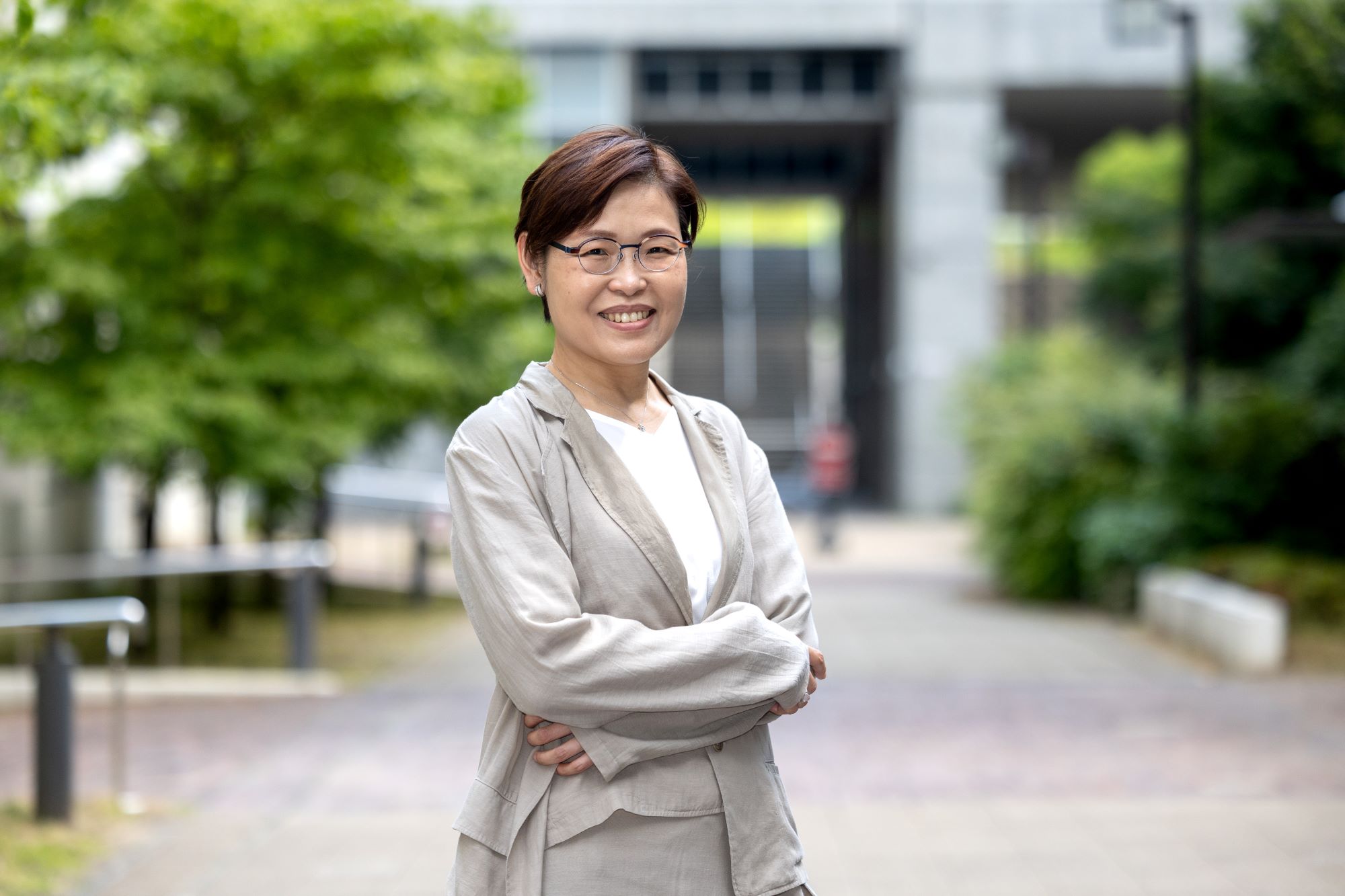
Professor Mari Nagata, Graduate School of Law and Politics
"Legal system confronts increasing globalization and international mobility"
Professor Mari Nagata specializes in private international law. Over the past ten years, she has engaged in international family law and in an international network for bilingual and bicultural mediations for cross border family conflicts and child abductions. She has also recently embarked on a new research project on gender divergence and private international law.
Globalization now affects every social system in every country. Cross-border mobility of people is becoming ever more intense, while diversity in culture and identity has been growing in this transformation of society.
International family mediation aimed at amicable solutions
Legal systems are, among others, confronting such a changing society. One example is an issue resulting from separation and divorce in cross-border marriages and/or partnerships. Cases involving children are particularly prone to facing conflicts.
The Hague Conference on Private International Law (HCCH) adopted the Convention on the Civil Aspects of International Child Abduction (the Hague Convention) in 1980 (enacted in 1983), with Japan participating since 2014.
The objective of the Hague Convention is to secure the prompt return of children who have been unlawfully removed to, or are unlawfully retained in, a Contracting State, and to ensure that the rights of custody and/or access under the law of a Contracting State are effectively respected in the other Contracting State. In other words, both of the Hague Convention's two stated objectives are concerned with how to prevent the abduction of a child, or how to minimize the negative effects of the abduction that has taken place, which requires efforts by everyone involved in the case, including parents, legal professionals, relevant public service officers, and so forth. The Hague Conference encourages professionals and parents to use mediation as a resource to settle cross-border family conflicts [1] .
Mediation in an international context aims to reach amicable solutions by encouraging dialogues between the parties while taking the child’s future into account. In contrast, traditional Japanese mediation is a completely different dispute resolution system in the sense that mediators, including a presiding judge, offer a certain solution to the parties while hearing their wishes. Professor Nagata has engaged in research on international mediation and has jointly worked with a non-profit organization called MiKK e. V. International Mediation Centre for Family Conflict and Child Abduction based in Germany for more than ten years.

MiKK organizes bilingual and bicultural mediation worldwide for parents in accordance with its internationally renowned mediation model, which uses mediators who have been specially trained by MiKK. For over 10 years, MiKK has assisted thousands of parents locked in seemingly unsolvable conflicts in finding sustainable and amicable solutions that are in the best interests of their children.
MiKK also offers information, training and consultation to judges, lawyers, social services and consular representatives, based on the “4B Co-meditation Model” they have developed; bilingual, bicultural, bi-professional and bigender where applicable. Collaborating with MiKK, Professor Nagata launched the research project “Mediation in International Family Matters (MIFA)” in 2016, aiming to propose the Japanese style of an ideal international family mediation system.
In this research project, Professor Nagata has started to promote and organize training programs based on the MiKK model in Japan in collaboration with other researchers, lawyers, practitioners, and private alternative dispute resolution (ADR) organizations in the country. MiKK model mediation requires a high level of facilitation by the mediators who strictly observe confidentiality. These mediators should have knowledge and understanding of the different legal schemes as well as psychological professional skills such as active listening, paraphrasing, and so on. They work together to encourage dialogue between the parties in order to reach a solution. So far, more than ten practitioners were admitted as qualified international family mediators from MiKK.
Professor Nagata would like to continue her efforts to establish a unique Japanese system of international family mediation. She says, “In order to achieve this, I believe that it is necessary to build a system that is not “Galapagosized,” but rather one that takes into account the advantages of Japan's unique mediation system, which has a long history, while at the same time fully understanding that there are mediation systems that differ from the Japanese system and successfully incorporating technologies and other factors required by completely different mediation systems in other countries.

Gender divergence and private international law
Another issue in relation to international mobility of people that Professor Nagata has started to investigate is how “sex” is treated under international private law in the context of gender and civil status [2].
The relationship between gender and civil status has become seriously complicated by the emergence of LGBT and LGBTI issues in society. Intersex people face significant difficulties from birth. For example, in many countries gender must be indicated at birth registration, leading to forced medical interventions to match physical characteristics. Such interventions ignore the individual's will and negatively impact their lives. Gender-based treatment in detention also affects safety, and early medical interventions for gender determination can cause gender identity dissonance. To address these issues, some countries have begun to register intersex people as a gender different from male or female. However, this is not always recognized internationally, potentially hindering people's international mobility. According to Professor Nagata, these issues are not even recognized in Japan, and she pushes us to urgently respond to them.
As international mobility of people increases, the role of private international law has become more significant than ever before.
For further information on Professor Mari Nagata, visit: https://researchmap.jp/MariNagata
[1] Paul, C. C. and Kiesewetter, S. (Eds.). (2014). Cross-Border Family Mediation: International Parental Child Abduction, Custody, and Access cases. Frankfurt am Main: Wolfgang Metzner Verlag.
[2] International Law Association. (2023). White Paper No. 10: Civil Status. Available at: https://www.ilaparis2023.org/wp-content/uploads/2022/11/ETAT-CIVIL-EN.pdf
Text: Saori Obayashi/Edit: Christopher Bubb